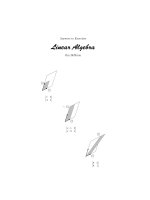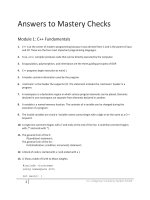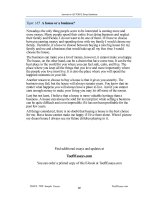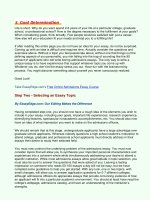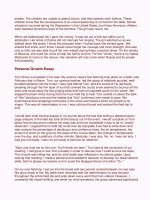Answers to Mastery Checks
Bạn đang xem bản rút gọn của tài liệu. Xem và tải ngay bản đầy đủ của tài liệu tại đây (1.82 MB, 43 trang )
1
C++ A Beginner’s Guide by Herbert Schildt
Answers to Mastery Checks
Module 1: C++ Fundamentals
1. C++ is at the center of modern programming because it was derived from C and is the parent of Java
and C#. These are the four most important programming languages.
2. True, a C++ compiler produces code that can be directly executed by the computer.
3. Encapsulation, polymorphism, and inheritance are the three guiding principles of OOP.
4. C++ programs begin execution at main( ).
5. A header contains information used by the program.
6. <iostream> is the header the supports I/O. The statement includes the <iostream> header in a
program.
7. A namespace is a declarative region in which various program elements can be placed. Elements
declared in one namespace are separate from elements declared in another.
8. A variable is a named memory location. The contents of a variable can be changed during the
execution of a program.
9. The invalid variables are d and e. Variable names cannot begin with a digit or be the same as a C++
keyword.
10. A single-line comment begins with // and ends at the end of the line. A multiline comment begins
with /* and ends with */.
11. The general form of the if:
if(condition) statement;
The general form of the for:
for(initialization; condition; increment) statement;
12. A block of code is started with a { and ended with a }.
13. // Show a table of Earth to Moon weights.
2
C++ A Beginner’s Guide by Herbert Schildt
14. // Convert Jovian years to Earth years.
15. When a function is called, program control transfers to that function.
16. // Average the absolute values of 5 numbers.
3
C++ A Beginner’s Guide by Herbert Schildt
Module 2: Introducing Data Types and Operators
1. The C++ integer types are
The type char can also be used as an integer type.
2. 12.2 is type double.
3. A bool variable can be either true or false.
4. The long integer type is long int, or just long.
5. The \t sequence represents a tab. The \b rings the bell.
6. True, a string is surrounded by double quotes.
7. The hexadecimal digits are 0, 1, 2, 3, 4, 5, 6, 7, 8, 9, A, B, C, D, E, F.
4
C++ A Beginner’s Guide by Herbert Schildt
8. To initialize a variable, use this general form:
type var = value;
9. The % is the modulus operator. It returns the remainder of an integer division. It cannot be used
on floating-point values.
10. When the increment operator precedes its operand, C++ will perform the corresponding
operation prior to obtaining the operand's value for use by the rest of the expression. If the
operator follows its operand, then C++ will obtain the operand's value before incrementing.
11. A, C, and E
12. x += 12;
13. A cast is an explicit type conversion.
14. Here is one way to find the primes between 1 and 100. There are, of course, other solutions.
Module 3: Program Control Statements
1. // Count periods.
5
C++ A Beginner’s Guide by Herbert Schildt
2. Yes. If there is no break statement concluding a case sequence, then execution will continue on
into the next case. A break statement prevents this from happening.
3.
4. The last else associates with the outer if, which is the nearest if at the same level as the else.
5. for(int i = 1000; i >= 0; i -= 2) // ...
6. No. According to the ANSI/ISO C++ Standard, i is not known outside of the for loop in which it is
declared. (Note that some compilers may handle this differently.)
7. A break causes termination of its immediately enclosing loop or switch statement.
6
C++ A Beginner’s Guide by Herbert Schildt
8. After break executes, “after while” is displayed.
9.
10.
11. // Change case.
7
C++ A Beginner’s Guide by Herbert Schildt
12. C++’s unconditional jump statement is the goto.
Module 4: Arrays, Strings, and Pointers
1. short int hightemps[31];
2. zero
3. // Find duplicates
8
C++ A Beginner’s Guide by Herbert Schildt
4. A null-terminated string is an array of characters that ends with a null.
5. // Ignore case when comparing strings.
9
C++ A Beginner’s Guide by Herbert Schildt
6. When using strcat( ), the recipient array must be large enough to hold the contents of both
strings.
7. In a multidimensional array, each index is specified within its own set of brackets.
8. int nums[] = {5, 66, 88};
9. An unsized array declaration ensures that an initialized array is always large enough to hold the
initializers being specified.
10. A pointer is an object that contains a memory address. The pointer operators are & and *.
11. Yes, a pointer can be indexed like an array. Yes, an array can be accessed through a pointer.
12. // Count uppercase letters.
10
C++ A Beginner’s Guide by Herbert Schildt
13. Multiple indirection is the term used for the situation in which one pointer points to another.
14. By convention, a null pointer is assumed to be unused.
Module 5: Introducing Functions
1. The general form of a function is
2.
11
C++ A Beginner’s Guide by Herbert Schildt
15. Yes, a function can return a pointer. No, a function cannot return an array.
16. // A custom version of strlen().
5. No, a local variable’s value is lost when its function returns. (Or, more generally, its value is lost
when its block is exited.)
6. The main advantages to global variables are that they are available to all other functions in the
program and that they stay in existence during the entire lifetime of the program. Their main
disadvantages are that they take up memory the entire time the program is executing, using a
global where a local variable will do makes a function less general, and using a large number of
global variables can lead to unanticipated side effects.
7.
12
C++ A Beginner’s Guide by Herbert Schildt
8.
13
C++ A Beginner’s Guide by Herbert Schildt
9. True. A prototype prevents a function from being called with the improper number of
arguments.
10.
Module 6: A Closer Look at Functions
1. An argument can be passed to a subroutine using call-by-value or call-by-reference.
14
C++ A Beginner’s Guide by Herbert Schildt
2. A reference is an implicit pointer. A reference parameter is created by preceding the parameter
name with an &.
3. f(ch, &i);
4.
5.
15
C++ A Beginner’s Guide by Herbert Schildt
6. A function should not return a reference to a local variable, because that variable will go
out-of-scope (that is, cease to exist) when the function returns.
7. Overloaded functions must differ in the type and/or number of their parameters.
16
C++ A Beginner’s Guide by Herbert Schildt
8.
17
C++ A Beginner’s Guide by Herbert Schildt

